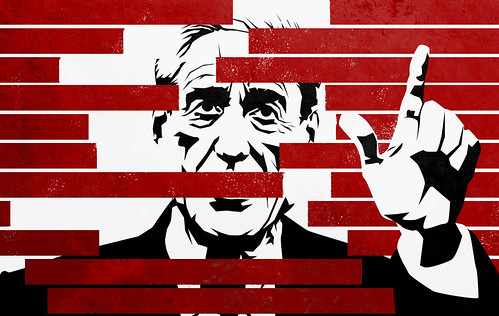From Truthout
The Mueller report did not find evidence that contacts between Trump campaign advisers and staff and Russians during the 2016 election campaign constitute "collusion" or "conspiracy" with a Russian effort to elect Donald Trump.
Nevertheless, Mueller's report is bound to prolong the U.S. political obsession with the Trump-Russia collusion narrative, because it keeps alive the idea that Trump campaign contacts with Russians were a threat to U.S. national security.
That view will encourage Democrats in Congress and the corporate media figures still committed to the Trump-Russia narrative to push the issue for many months to come. That means that Congress and the media will be diverted from the real domestic threats to democracy that stem both from the Trump administration's anti-democratic policies and from the dysfunctional U.S. political system.
The continued focus on the collusion narrative also plays into the hands of the national security state and powerful arms contractors, which have stoked the new Cold War with Russia. For senior officials in the national security state, the threat to American interests in 2016 was not only Russian "meddling" in the election but also Trump's perceived interest in improving relations with Moscow, which would mean relaxing sanctions. They viewed Trump as a threat after he declared in his first major foreign policy address as candidate on April 26, 2016, "We desire to live peacefully and in friendship with Russia and China" and said, "This horrible cycle of hostility must end and ideally will end soon."
Just before stepping down as CIA director in January 2017, John O. Brennan issued an extraordinary warning to Trump in an interview with Fox News not to stray from the established hardline policy toward Russia. "I think Mr. Trump has to understand," Brennan declared, "that absolving Russia of various actions that it's taken in the past number of years is a road, that he, I think, needs to be very, very careful about moving down."
The national security bureaucracy has an overriding interest in keeping heavy pressure on Russia and the Putin government and on mobilizing public support and resources for a more aggressive policy toward Russia, including a military buildup for potential war and more emphasis on offensive-use cyber war capabilities.
Mueller, a former FBI director who was deeply involved in justifying the Bush administration's aggressive war in Iraq, clearly shares the same political perspective and interests. Although the report makes no direct judgment about the motive behind the contacts with Russians, it is based on the implicit assumption that contacts between a presidential campaign and Russian officials or intermediaries are contrary to the national interest. That idea is extended even further, moreover, to include contacts with anyone who had ever been a Russian official or was alleged to be "linked" in some way to the Russians an idea that has been adopted in media coverage of the Mueller investigation.
The Trump Tower Meeting and the Moscow Trump Tower NegotiationsMueller's accounts of two episodes that have been the subject of intensive media and Congressional suggestions of collusion the June 2016 Trump Tower meeting between campaign officials and Russian lawyer Natalia Veselnitskaya and Trump's negotiations with a Russian real estate company on a Trump Tower in Moscow show clearly that they were nothing of the sort.
The Trump Tower meeting has been depicted as clear evidence of the Trump campaign responding with alacrity to an offer of dirt on Hillary Clinton by a lawyer linked to the Kremlin. But Mueller's account makes it clear that it was merely about an offer of the kind of opposition research material that is commonly used in campaigns and far less sensational than what was gathered in the now-discredited Steele Dossier.
Although publicist Rob Goldstone had told the Trump campaign that Veselnitskaya was offering information that represented the Russian government's assistance to Trump's campaign, she was actually a former Russian prosecutor who had been an independent lawyer since 2001. Her client was the son of Russian businessman Peter Katsyv, whose company was a defendant in a civil forfeiture action in the United States related to the Magnitsky act.
Veselnitskaya had no connection to the Clinton emails. She was merely offering a document alleging that two U.S.-based businessmen, Dirk and Daniel Ziff, had engaged in tax evasion and money laundering in Russia and had used some of their ill-gotten gains to contribute to the Democratic National Committee (DNC). But when Donald Trump, Jr. asked if any of the illegally obtained money could be traced to Clinton, she admitted that it was doubtful, and the Trump campaign figures lost interest.
The Mueller account of Trump's negotiations over a possible Trump Tower in Moscow in 2015-16 included the previously published story about Russian-American real estate developer and racketeer Felix Sater that had generated sensational headlines. Sater was representing the Russian company with which Trump signed a nonbinding Letter of Intent in late October 2015 to build a Moscow Trump Tower.
A few days after the signing Sater boasted in an email to Michael Cohen, executive vice president of the Trump Organization, "I will get Putin on the program, and we will get Donald Trump elected." And later in the day, he referred to getting Putin to endorse Trump's negotiating prowess in a press conference.
That boast generated stories suggesting possible collusion. But far from being a Putin agent, Sater been an informant for the FBI ever since he signed a 1998 cooperation agreement to avoid punishment on a racketeering charge to which he pleaded guilty. According to a 2011 Justice Department court filing, he had "provided the United States intelligence community with highly sensitive information concerning various terrorists and rogue states."
(Note: You can view every article as one long page if you sign up as an Advocate Member, or higher).






